At the bottom of the video… select “English” in the subtitle bar. The ‘title’ on the screen reads: Eliecer Ávila makes a fool of Ricardo Alarcón
This event is from 2012.
English Translations of Cubans Writing From the Island
At the bottom of the video… select “English” in the subtitle bar. The ‘title’ on the screen reads: Eliecer Ávila makes a fool of Ricardo Alarcón
This event is from 2012.

![]() 14ymedio, Havana, January 16, 2019 — A group of Cuban opponents, including Eliécer Ávila, have convened a march for Saturday, January 26, in front of the Cuban embassy in Washington to request a No vote in the constitutional referendum of this coming February 24th. Several organizations of Cubans living in other countries have decided to embrace the call to protest at the diplomatic offices of the countries where they live.
14ymedio, Havana, January 16, 2019 — A group of Cuban opponents, including Eliécer Ávila, have convened a march for Saturday, January 26, in front of the Cuban embassy in Washington to request a No vote in the constitutional referendum of this coming February 24th. Several organizations of Cubans living in other countries have decided to embrace the call to protest at the diplomatic offices of the countries where they live.
The organizers believe that it is important to “send a loud and clear message (…) with sufficient time in advance about the need to vote No in the upcoming constitutional referendum” Ávila explains to 14ymedio. continue reading
It is not the only demand of the call for a public protest with the motto Protest for all the prohibitions, which attempts to reclaim the freedom of entry and exit to/from the Island “without restrictions, nor black lists.” In addition, the organizers demand “having a passport at an accessible price for all,” dignified treatment in the ports and airports, and the right of Cubans to invest in Cuba with full legal guarantees. Under current law foreigners can invest in Cuba but Cubans cannot.
Added to this list are the petitions for several political rights such as the right of Cubans abroad to vote in all elections and popular consultations that take place in Cuba, the direct vote for the Presidency of the Republic and the claim for a plural and democratic constituent process, in which a Constitution is written that represents, protects and inspires all Cubans.
The call to gather was created by Lucio Enriquez Nodarse and, according to Ávila, has two fundamental slogans: #YoVotoNo (IVoteNo)and #NoMásProhibidos (NoMoreProhibitions). Although the day chosen for the rally was January 28, the anniversary of José Martí’s birth, it was moved to the 26th which is on the weekend. “The birth of the Cuban apostle who dedicated his life to uniting his people seemed inspiring to us to conduct the protest,” he explained.
Some Cubans living in Europe have organized an encounter at the Cuban Consulate in Madrid and another in front of the UN Human Rights Commission in Geneva. Eliécer Ávila introduced on his Facebook profile two of the young Cubans who will be “volunteers” organizing the marches: Osneir Fonseca in Santiago de Chile in South America, and Grette León in Europe.
Ávila points out that the invitation is aimed above all to Cubans themselves in order to “gain self-confidence and raise morale in a struggle that sometimes requires injections of energy.” The event can be, in his eyes, a “very powerful” message for their families in Cuba and “to the dictatorial government that does not believe we are capable of organizing and acting together.”
However, the lack of wherewithal means the march depends on the will and efforts of those involved. “The modest sums that we receive as personal donations only cover 15% of the preparations in other areas. So we spoke very clearly and, to our surprise, personal initiative has been the main protagonist of this call to action. Each individual has given a bit of themselves and we already have hundreds of confirmations of travel by bus, train, family cars, plane, etc. The total opposite of a May 1 in Havana. Here it is not the State nor the Party that is responsible for the expenses, each citizen takes action via his own ideas and resources,” explains Ávila, who foresees a four-hour duration for the event.
Among the organizers of the march in the United States are, among others, the presenter Alex Otaola, the exiled Amaury Almaguer and Siro Cuartel, author of the political satire blog El Lumpen. In addition, Ávila adds that several artists have confirmed their presence, such as Michel Marichal, Randy Berlanga, Dayana Elías and Erich Concepción.
Eliécer Ávila has resided in the United States for more than a year, but has not yet exceeded 24 months abroad, after which Cuba requires additional formalities from its citizens wishing to return to the Island. However, he considers that he must mobilize as if he were affected by the problem. “They have forbidden too many things to me, too many rights. And to my family as well. So that one prohibition more or less does not make a difference,” he argues.
On the day of the march those present will include “many people who habitually travel to Cuba, but can’t invest, vote, nor have reasonable costs and treatment for their paperwork. The motives are many and each Cuban has them to some extent.”
Translated by Wilfredo Díaz Echevarria
_____________________________
The 14ymedio team is committed to serious journalism that reflects the reality of deep Cuba. Thank you for joining us on this long road. We invite you to continue supporting us, but this time by becoming a member of 14ymedio. Together we can continue to transform journalism in Cuba.

![]() 14ymedio, Eliécer Ávila, Virginia, 19 February 2018 — By now my first child, Elisa, has been born, after having withstood the stress and the ups and downs that we faced as a family during the first months of pregnancy in Cuba.
14ymedio, Eliécer Ávila, Virginia, 19 February 2018 — By now my first child, Elisa, has been born, after having withstood the stress and the ups and downs that we faced as a family during the first months of pregnancy in Cuba.
At the beginning we were afraid, because no one manages to completely remove himself from all of that omnipresent propaganda that suggests that anyone can die from a lack of medical attention in the United States. Despite the enouraging messages of my very dear friends, deep down we were uncertain about how it would be possible to integrate ourselves in the health care system and have the pregnancy monitored until the time of delivery. We also questioned ourselves about what would happen after. continue reading
We do not have refugee status, or a social security number, or the support of political organizations or foundations, and had less-than-sufficient money to take the expenses of the whole process on ourselves. We immediately set off for the nearest health center, and there we were given information about what we should do in this situation. After filling out three forms and being attended to by two secretaries, we were already heading off towards the clinic that would be, from that point on, our hospital center for the next four months.
The cost of birth was assumed by the State through Medicaid. Starting at that moment and continuing through the next five years, part of our daughter’s medical coverage is covered through this insurance. Apart from this, we receive alimentary support through the Special Supplemental Nutrition Program for Women, Infants, and Children (WIC, as it is abbreviated in English), which is also of a public nature and finds help for low-income women.
Given that we did not have an income and were existing on the lowest step of the health system’s standard of living, we planned to find ourselves with basic medical care that was probably lacking many comforts that an official insurance plan guaranteed.
We were tremendously surprised upon entering through the doors of the medical center. The quality of the infrastructure, where each detail ran properly, the extreme cleanliness that provided a pristine environment, and the organization of the internal processes of the place made us feel absolutely secure and comfortable.
It should be noted that, in the immense majority of cases, the patients that shared the waiting rooms with us for a few minutes were Central Americans and African Americans, some accompanied by several children and waiting for the next.
Beyond the physical aspect–the equipment used, the internet access, the instruments, most of which were disposable for safety–I have concentrated on those parts which every health system in the world should keep in mind, and I do not doubt that at one point in time these formed part of the good practices of the Cuban healthcare system, before all of the deterioration, budget cuts, and lack of incentives destroyed the quality of care until it reached the current disaster level.
Each weekly appointment is coordinated with the patient and her family to find the most convenient days and times. Once it has been set, you receive a written record. When the date approaches, you receive an email or an SMS as a reminder. There is also the possibility to reschedule the appointment.
In the consultation, everything flows naturally. Without screams in the hallway, or people sweeping your feet. No one smokes in the establishment, and the language used is extremely cordial, human, and respectful.
Each patient and her companion meet alone with the doctor or the nurse. Before each important question they consult the patient, and nothing ventures outside of this framework. In fact, before each important question the specialists ask the patient if they would like their companion, be it their husband or their wife, to be present. If any check is necessary, everyone leaves the room except for the doctor.
Experiencing this type of treatment causes me to remember when I was an adolescent and I developed two growths on my knee and my elbow, I imagine from taking baths in rivers and stagnant dams. I took quite a difficult dermatological turn and, while I was waiting in the endless line in the hallway, on foot, at three in the afternoon without lunch, the nurse who had taken my details came out and called for me, yelling: “The boy from the country, the one with the pimples!”. Everyone present, including two very beautiful girls who I had been admiring, searched for me among the crowd to know who “the one with the pimples” was. Before the third call and sweating with shame I answered with another yell to the woman: “Well, I have a wart: could it be me?” To which she responded, “Obviously, moron. How many Eliécer Ávila del Yareys do you believe there are here, son? Go on!”
Among the giggles, I entered the consultation, in which there were three cubicles and they were waiting for me in the last one to burn it off. In the first there was a woman with her legs open; in the following I recognized the voice of one of my classmates who was speaking about a fever following a curettage; and in the last there was a gray-haired man who screamed at me: “Fuck, you’re the son of a Chinese! Look at how they beat you.” All this in the midst of the laughs of the front cubicles. The whole towns knew of the works and miracles that happened in that hospital.
Here, each step of treatment, whether a lab test or physical adjustment, is explained to you in detail so that you understand it and then decide whether or not you authorize the doctor to do it. Your body is an individual temple over which you exercise complete sovereignity. In fact, many people refuse certain traditional practices and opt instead for natural and even spiritual versions of certain methods. They respect it completely, always reminding you that you act under your own responsibility.
We were not accustomed to having options, and it was difficult for us to choose. In Cuba, we have never been asked if we want this or that, if we give consent to be touched, or even if they could examine us.
Coming from Cuba, we were used to others making decisions for us, even about our health. We did not have control over what happened, and many times we were not even able to give an account if there had been any negligence. In the U.S., the opposite has happened and, sometimes, this respect toward the patient can be overwhelming for someone who is not accustomed to it, although they end up accepting it.
I do not pretend that this testimony makes a comprehensive comparison between the health care systems of Cuba and the U.S. It addresses our personal experience and I do not doubt that on the Island, at least as far as human capital is concerned, we would have received appropriate attention.
My desire is that every Cuban can enjoy true quality of medical attention on the Island, such as that which we have come to know. This is something that I believe depends on the Government that prevails in our country and on the political and economic system that we construct.
Translated by: Emilee Sullivan
________________________
The 14ymedio team is committed to serious journalism that reflects the reality of deep Cuba. Thank you for joining us on this long road. We invite you to continue supporting us, but this time by becoming a member of 14ymedio. Together we can continue to transform journalism in Cuba.
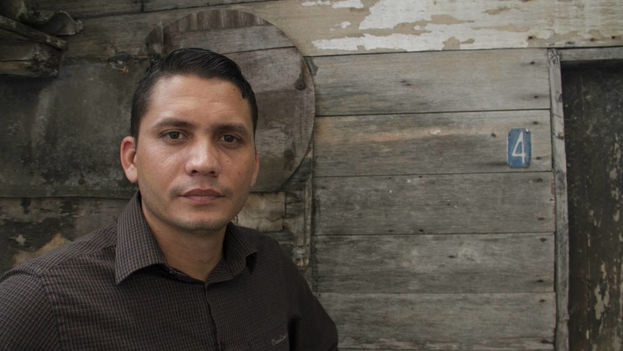
![]() 14ymedio, Havana, 14 August 2017 – The Office of the Attorney General of Cuba declared the “final dismissal” of the case against the activist Eliécer Ávila, accused of the crimes of receiving and illegal economic activities. The court also ordered the seizure “in favor of the Cuban State” of most of the property seized during a police search in April.
14ymedio, Havana, 14 August 2017 – The Office of the Attorney General of Cuba declared the “final dismissal” of the case against the activist Eliécer Ávila, accused of the crimes of receiving and illegal economic activities. The court also ordered the seizure “in favor of the Cuban State” of most of the property seized during a police search in April.
On 5 August, the leader of the Somos+ (We Are More) Movement received on a document signed by the prosecutor Bileardo Amaro Guerra dated July, to which he gave 14ymedio access. In it he is informed that the accusations have been “filed.” “We have considered the lack of criminal record of the accused and the attitude maintained during the process,” explains the text. continue reading
The measure adopted by the Public Prosecutor’s Office corresponds to what was stated in the Law of Criminal Procedure, whereby the prosecutor has the power to dismiss a case “if he considers that the act is not a crime or is manifestly false, or the accused as authors or accomplices are exempt from criminal responsibility.”
Avila has decided to appeal the seizure of his belongings, of which only three personal organizers, an almanac and an old travel insurance policy were returned to him. The remaining belongings, whose list in the judicial document covers ten pages of objects seized during search, will pass into the hands of the State, including a personal computer and mobile phone.
Avila’s defense lawyer, Osvaldo Rodríguez Díaz, has appealed the prosecutor’s order because the document is full of “gibberish.” “In its content it refers to activities of a non-governmental organization,” in reference to Somos+, but the accusation against the activist is based on an alleged economic crime.
Rodríguez also questions that, given the economic nature of the allegations, the case has been taken to Villa Marista, the headquarters of State Security in Havana.
The prosecutor’s document says Avila “sells clothing at home, when what was actually seized is something else,” says the defense lawyer, for whom the arguments are “far from being considered serious by that instance, of legality and truth.”
Wilfredo Vallín, President of the Law Association of Cuba, confirmed to 14ymedio that “the final destination of the items that are seized in a search should be decided by the court” and that “what is seized in a house is to be presented in court as evidence to indict the person.” He describes the prosecutor’s order as “a totally illegal procedure” in this case because “it is a group of objects of high value.”
The search in Avila’s house happened after several members of his movement held a protest at the International Airport Jose Martí of Havana to demonstrate against Customs, which confiscated the belongings of several activists who returned from a seminar organized in Colombia by the Center for the Opening and Development of Latin America.
Police records and searches of dissidents have become a growing practice in the past year, and the Cuban Commission on Human Rights and National Reconciliation has denounced this in its reports.
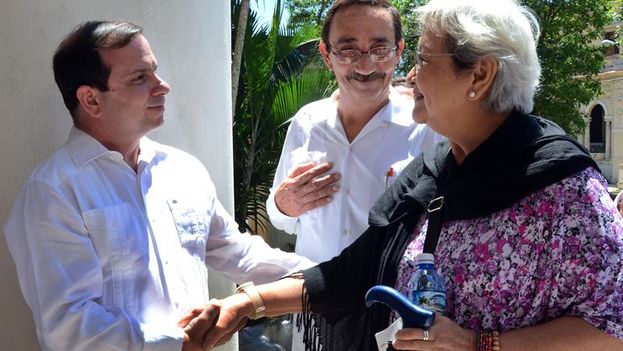
![]() 14ymedio, Eliecer Avila, Havana, 15 July 2017 — The visit to Cuba by United Nations expert on Human Rights, Virginia Dandan, ended this Friday. The press conference she offered before leaving fueled expectations, after spending several days in an intense program of meetings and activities “on the ground.”
14ymedio, Eliecer Avila, Havana, 15 July 2017 — The visit to Cuba by United Nations expert on Human Rights, Virginia Dandan, ended this Friday. The press conference she offered before leaving fueled expectations, after spending several days in an intense program of meetings and activities “on the ground.”
In her statements, however, the official from the Philippines made no mention of the human rights situation on the island, but merely praised its system of international cooperation. In passing, she regretted the country’s limitations in accessing new technology, due to the US embargo.
Her analytical myopia revived the criticism of many towards international agencies linked, or not, to the United Nations. An international “bureaucracy” that no longer responds to its original meaning and has become a lever of influence for some governments to manipulate its mechanisms and officials. continue reading
This practice came to a head when representatives from North Korea, Venezuela and Cuba joined the Permanent Council on Human Rights in Geneva. That these confessed violators occupy such responsibilities is not the most worrisome, rather it is that the rest of the world accepts it without pressing for their immediate dismissal.
In her statements, the Philippine official made no mention of the situation of human rights on the island, but merely praised its system of international cooperation
After that, there is little room for astonishment, but Mrs. Dandan has succeeded in sparking outrage against the agency she represents. Despite being an expert, she allowed herself to speak from disinformation about a government that does not hide from – and even prides itself on – violating the fundamental rights of its citizens.
It would have been enough for the expert to search in the social networks to find evidence of the situation Cubans live in. She would have seen the videos with the mobs gathered by the government shouting “down the human rights” and images of police searches where copies of the Universal Declaration of Human Rights are taken as “proof” of the crime of subversive activity.
If, before arriving in Cuba, Dandan did not have time to check the internet, just looking out the window of the vehicle that brought her from the airport to the city she would have noticed the cult of personality that crushes, bores and frightens. The numerous billboards and posters that along the way impose the image of the two brothers who have ruled the country for almost 60 years are a distinctive detail of a totalitarianism, and should not have gone unnoticed by her keen eye.
On the other hand, Mrs. Dandan specializes in the area of education but did not go out into the streets of Havana to ask a child about the teaching of human rights in his or her school, or, more precisely, the rights of the child. Instead, she preferred meetings in the comfortable halls of the Cuban Institute of Friendship with Peoples or in the Ministry of Foreign Affairs.
Undoubtedly, the Government of Raúl Castro estimated the usefulness of the expert’s visit and scheduled it to take place a few days after seeing the new Bilateral Agreement with the European Union
The expert could have inquired of any passer-by whether they belonged to one party or another, or who their favorite candidate is for the upcoming election, to receive the disturbing answer that there is only one party and the president is not directly elected. But was Virginia Dandan willing to listen to that part of reality?
Undoubtedly, the Government of Raúl Castro estimated the usefulness of the expert’s visit and scheduled it to take place a few days after seeing the new Bilateral Agreement with the European Union and its clause regarding respect for human rights that have so greatly bothered officialdom.
This situation coincided with the change of rhetoric of the United States and the new policy of Donald Trump towards the Island. “A good moment,” the Place of the Revolution surely must have thought, to pull out a letter and generate some positive headlines about human rights.
However, the opinion of the chosen expert has been so precarious and biased to make the diagnosis that she didn’t even manage to amortize the investment made by the Government to cover her days spent on the island.
In the case of Cuba, Dandan lost the opportunity to put her ear closer to parents, elders, young people, entrepreneurs trying to carry out an independent project and activists who report frequent human rights violations. She preferred to listen to the victimizers instead of the victims.
![]() 14ymedio, Eliecer Avila, Havana, 1 July 2017 – The Cuban revolution has been, above all, an enormous consortium of audiovisual production with global reach. Outside of the Island, this propagandistic flow competes with other products, but within, it roams freely, convinces some, confuses others and paralyzes the will of sectors indispensable to social change.
14ymedio, Eliecer Avila, Havana, 1 July 2017 – The Cuban revolution has been, above all, an enormous consortium of audiovisual production with global reach. Outside of the Island, this propagandistic flow competes with other products, but within, it roams freely, convinces some, confuses others and paralyzes the will of sectors indispensable to social change.
For more than half a century, officialdom has been preoccupied with the creation of emblematic songs, heavily ideological animated pictures; novels, ventures and series that spread their version of history, plus news and books geared towards maintaining the status quo.
That audiovisual machinery is so embedded in daily life that some barely notice its presence; but for a newcomer, it stands out.
A while back, a Peruvian journalist who had not been to Cuba insisted on researching why Cubans continue to live under a totalitarian regime when all of Latin America is democratic. continue reading
No explanation satisfied him, but the reporter travelled to the Island in order to report about the recently opened relations between Washington and Havana. During his stay he was able to watch television, listen to the radio, read newspapers and talk with people… After three days he called a friend in order to tell him – half-scared – that he now understood what was happening.
Cubans, with few exceptions, have peculiar ideas about world events and especially about their own reality, as that journalist learned. When questioned about the source of their “certainties,” the nationals invariably cite the official daily Granma, the primetime television newscast and the TeleSur channel.
The amazed visitor heard in the street that “the FARC are a group of revolutionaries that fight for social justice.” Meanwhile, others feel relieved because “there is a leader like Vladimir Putin who puts a stop to the excesses of the imperial Yankee” or assert that these days “the majority of Russians seek the return of Communism.”
In his time on the Island, the reporter heard people assert that “ISIS is an invention of the United States to encourage conflict in the Arab world and keep its oil resources,” while in Latin America “children die of hunger, without rights to health care or education.”
The man could not believe it when a citizen swore to him that “the internet is a weapon of the U.S. to spy on those who do not subordinate themselves to its designs,” that the Island is “more democratic than the U.S. and Europe” and that “human rights activists just want to leave the country.”
Although new technology has helped remove the rigid national mentality and diversified opinion about many topics, to underestimate the propagandistic apparatus of the Communist Party is a mistake.
The official media continues to have a monopoly on the reach, quantity, immediacy and depth of reporting, which is the key to understanding the country’s civic stagnation.
An example of this is the recently concluded broadcast of the latest jewel of national television, the series, The Other War, an adventure dedicated to the “fight against the bandits” in Cuba’s Escambray Mountains, a rebellion that took place in the first six-years after the triumph of the Cuban Revolution. The production achieved a wide audience, and afterwards many cried, reflected and reached conclusions “applicable to these times.”
Each chapter, featuring excellent actors of various generations, described the excesses of the “counter-revolution supported by the U.S.” and at the same time highlighted the values of patriotism, heroism, and commitment of the State Security and other government forces.
As a whole, the material was plagued with omissions, manipulations, and distortions of facts and characters. It disregarded that in that era excesses were committed on every side and that not only the “Batistianos” rose up in arms but also the rebels who made the Revolution and later saw how their path became twisted.
However, there are hardly any available audiovisual materials, and of good artistic workmanship, that effectively contradict this version.
While from exile each year millions of dollars are spent and ultimately dissolved in tangled bureaucratic ways, the creation of a film industry has not been stimulated to rival the totalitarian hegemony in the diffusion of content within the Island.
This situation is paradoxical considering that among the diaspora is found the immense majority of the best artists, musicians, actors, screenwriters, historians, and technicians related to film, television and audiovisual production.
Many private or institutional donors who want to contribute to the Cuban cause still underestimate the power of the media and prefer to bet on other methods. They forget that the Soviet hierarchies themselves once blamed Hollywood and Walt Disney for the debacle that the system suffered.
The idea of Cuba’s freedom needs a modern narrative, with means to amplify its reach and transmit democratic values. For more than five decades the Plaza of the Revolution has been using mass media to impose its version of history. That is why it is so important for the citizenry to have audiovisual content that combines quality and truth.
Translated by Mary Lou Keel
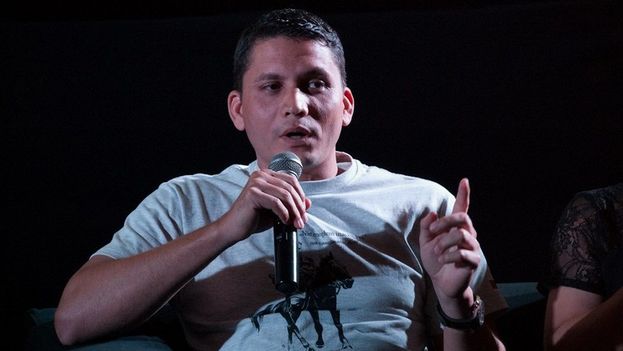
![]() 14ymedio, Yoani Sanchez, Havana, 8 April 2017 – Walking along the streets with Eliécer Ávila can be a complicated task. His face is well known thanks to a viral video broadcast almost a decade ago. However, before fame came into his life, this young man born in Las Tunas was a model “New Man”: the most finished product of ideological indoctrination.
14ymedio, Yoani Sanchez, Havana, 8 April 2017 – Walking along the streets with Eliécer Ávila can be a complicated task. His face is well known thanks to a viral video broadcast almost a decade ago. However, before fame came into his life, this young man born in Las Tunas was a model “New Man”: the most finished product of ideological indoctrination.
Like all Cuban children, Avila shouted slogans during his school’s morning assembly, participated in countless repudiation activities “against imperialism” and dreamed of resembling Ernesto ‘Che’ Guevara. But while, in school, they taught him the social achievements that the Revolutionary process brought to the population, at home reality was stubborn and showed itself to be something quite different. continue reading
The residents of Yarey de Vázquez are poor, the kind of poverty that grabs you by the throat
The residents of Yarey de Vázquez – the Puerto Padre municipality of Puerto Padre where the leader of the Somos+ (We Are More) Movement was born – are poor, the kind of poverty that grabs you by the throat. A place lost in nothingness, where many families still use latrines for their bodily needs, and live in houses with roofs made of palm fronds.
Surrounded by pigs, chickens and tedium, Avila realized that his life did not resemble the official version he was being taught. Born in 1985, in the middle of that “golden decade” when the Soviet Union was propping up the island, he was barely walking a year later when Fidel Castro ordered the closing of the free farmers markets in the midst of the “Process of Rectification of Errors and Negative Tendencies.”
Eliécer Avila reached puberty during what was called the Special Period. With the voracity that still characterizes him, he faced many days of his adolescence with his plate half full, or almost empty. He hand stitched the shoes he wore to school, invented all kinds of “outfits” from his grandfather’s old shirts, and turned off the light when it was time to strip down to his underwear, so no one could see the holes.
Surrounded by pigs, chickens and tedium, Avila realized that his life did not resemble the official version he was taught. He was born in 1985, in the middle of that “golden decade” when the Soviet Union was propping up the Island
With a natural leadership quality, in which a certain humor mixes with an undeniable histrionic capacity to narrate anecdotes, the young man made his way through those years without climbing aboard a raft to escape the country or ending up in jail. Those who knew him predicted a future in politics, because of those “fine lips” that helped him in student meetings and in romantic conquests.
A little bit later, luck smiled on him. He was able to enroll in the University of Computer Sciences (UCI), founded in 2002 in the middle of the Battle of Ideas. UCI was located on the site that had once been the Center for Exploration and Radioelectronics Listening, known as the Lourdes SIGNIT Station, where until 2001 Russia – and the Soviet Union before it – had had its largest spy station outside its borders. UCI was a school for trusted young people to become computer soldiers for a Revolution that fears the Internet.
While a student at UCI, Avila led Operation Truth. His task was to monitor digital sites and blogs critical of the Government. In those spaces, the young revolutionary sharpened his arsenal of tools for political struggle that included everything from hacking to the execution of the reputation of anyone who opposed the Plaza of the Revolution.
Little by little, like acid that filters through the cracks, those anti-government arguments he read on the web began to sink into his mind and mingle with his own disagreements. Restless, in 2008 he took his turn at the microphone during a visit to UCI of Ricardo Alarcón, then president of the National Assembly. The minutes of that public appearance that followed marked the rest of his life.
The video of the collision between Ávila and Alarcón jumped to first place in the hit parade on the clandestine networks that distributed audiovisuals. No one wanted to miss it, especially the moment when the leader of Parliament justified the travel restrictions imposed on Cubans by saying how congested the skies might be, if everyone were allowed to board an airplane.
Avila led Operation Truth while studying computer science; his task was to monitor digital sites and blogs critical of the Government
Now, nine years later, the young activist prefers not to be called “Eliécer, the one who debated with Alarcon,” but for the rest of his life it will be his most important letter of introduction to millions of Cubans. His challenge of power, with simple questions and a firm voice, has been one of the most accurate and best documented gestures of rebellion in almost six decades of Castroism.
After that, he received his punishment. After graduating, the authorities sent him to a remote Youth Computer Club to purge his audacity. It was the decisive moment in which he decided to cross the red line towards independence. He left the state sector, founded the Somos+ Movement and relocated to Havana. One audacious act after another.
The attacks rained down from all sides. State Security raised the level of pressure on his environment, traditional opposition leaders threw darts at the upstart, and there was no shortage of those who claimed that he was only a mole for the political police disguised as a dissident.
Since then, Ávila has tried to give shape to a civic discourse that uses new technologies and a less politicized language, closer to the concerns of ordinary people. But, like every dissident, he is caught in the grip of charges of illegal action, subjected to constant vigilance and assigned the halo of demonization imposed on anyone who does not applaud power.
Nothing is more disturbing to a system that has played with social alchemy than the fact of a creature from its own ideological laboratory turning against it
The numerous trips abroad that he has made since the Travel and Immigration Reforms of 2013 have allowed him to know the world, only to discover that the most exciting and indecipherable of the territories that await him is located in the future Cuba. That country so many have dreamed of and that is taking so long to arrive.
Recently he went a step further and announced that he was prepared to represent the electors of his constituency as a delegate. A somewhat remote possibility, given the oiled mechanisms of control over the People’s Assemblies maintained by the ruling party where, by show of hands, the attendees must nominate the potential candidates.
This week, the guajiro of Yarey de Vázquez has crossed another line. A public protest at José Martí International Airport has resulted in his house being searched, and him being arrested and charged with “illicit economic activity.” The trigger was the seizure of his laptop at Customs when he returned from Colombia.
Now, it is expected that the siege around the young leader and his Somos+ Movement will continue to close. Nothing is more disturbing to a system that has played with social alchemy than a creature from its own ideological laboratory turning against it. Eliécer Ávila will be doubly punished because power acts with more fury against its own, when it rebels.
More articles in English by and about Eliécer Ávila can be read here.
The video shows Eliecer Avila and other human rights activists at the Jose Marti International Airport in Havana, protesting the confiscation of Avila’s laptop when he returned to the country from abroad.
![]() 14ymedio, Havana, 8 April 2017 – Some fifty uniformed members of the National Revolutionary Police and the Ministry of the Interior raided the home of the activist Eliécer Ávila, leader of the Somos+ (We Are More) Movement this Saturday morning. The police seized documents and home appliances, in addition to arresting the opponent, according to detailed information from his wife, Rachell Vázquez, speaking to 14ymedio.
14ymedio, Havana, 8 April 2017 – Some fifty uniformed members of the National Revolutionary Police and the Ministry of the Interior raided the home of the activist Eliécer Ávila, leader of the Somos+ (We Are More) Movement this Saturday morning. The police seized documents and home appliances, in addition to arresting the opponent, according to detailed information from his wife, Rachell Vázquez, speaking to 14ymedio.
The police search began at six in the morning and lasted about four hours during which the troops did not allow access to the property located in the neighborhood of El Canal, in the Havana’s Cerro municipality. “We were going to eat something when they knocked on the door,” says Vázquez.
During the search, the police were accompanied by two witnesses of the Committee for the Defense of the Revolution (CDR). “All they left us was the TV,” adds the wife. “Right now Eliécer is missing, because no one knows where they took him,” he says. continue reading
Hours earlier, the couple was at Terminal 3 of José Martí International Airport, where Avila staged a protest to demand the return of several of his belongings retained by the General Customs of the Republic. Last Thursday, when the activist returned from a trip to Colombia, his personal laptop was confiscated.
After being arrested this Saturday Ávila made a phone call to his wife to inform her that he is being held at the Police Station of Aguilera and Lugareño
The opponent remained at the airport for more than 36 hours and insisted to security agents that he would not leave the place until they returned the computer. Other members of his organization joined in the protest.
After being arrested this Saturday Ávila made a phone call to his wife to inform her that he is being held at the Police Station of Aguilera and Lugareño in La Viñora. “He asked me to bring the deed of the house and 1,000 CUP,” says Vázquez, but “the police took the money in the drawers.”
In a video posted on the Somos+ website, Avila is seen in an airport lounge with two activists carrying posters with the phrase “No More Robbery.” The opponent denounced in front of the camera that the authorities “gave no explanations” and have not told him the reason for confiscating his computer.
Police searches and raids on dissidents’ homes have become common in the last year. In its report for March, the Cuban Commission on Human Rights and National Reconciliation (CCDHRN) denounced this procedure.
During that month “there were innumerable cases of dissidents deprived of their computers, cell phones and other means of work as well as cash,” the report adds. These actions are aimed “to prevent the work of peaceful opponents and to make them increasingly poor,” said the independent entity.
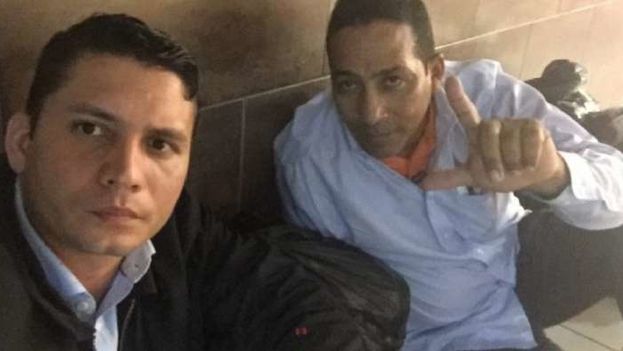
![]() 14ymedio, Havana, 6 April 2017 — Cuban opposition leaders were detained at Havana’s international airport on Thursday, when they arrived from Colombia, according to sources in the political movement Somos+ (We Are More) speaking with 14ymedio.
14ymedio, Havana, 6 April 2017 — Cuban opposition leaders were detained at Havana’s international airport on Thursday, when they arrived from Colombia, according to sources in the political movement Somos+ (We Are More) speaking with 14ymedio.
Eliécer Ávila, president of that movement remains “in open protest” at the capital’s airport after the authorities’ attempt to confiscate his electronic devices. continue reading
“Immigration has not allowed us to pass, it seems there are signs on the computers that say: interested in confrontation,” Avila explained in a message addressed to his movement. Later they were allowed to enter the national territory but in the face of the attempt to confiscate their belongings, the opponents rebelled.
Carlos Oliva, a member of the Patriotic Union of Cuba (UNPACU), is being held at the police station in Santiago de las Vegas. Eliecer Avila has said that he refuses to leave the airport without his laptop. The opponent has been there for more than seven hours.
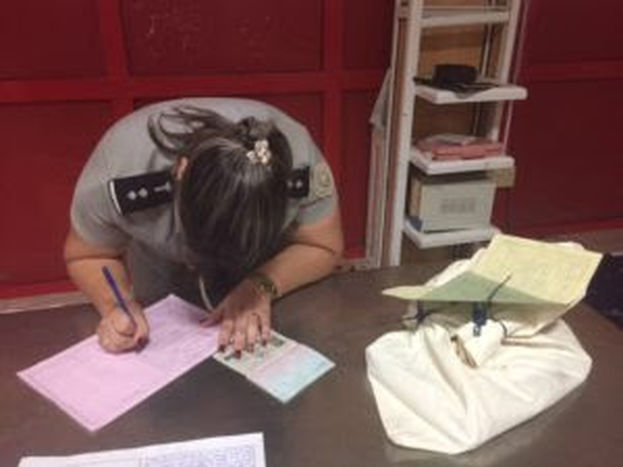
The order to seize his computer was issued by Carlos Pons, Chief of Confrontation at the airport.
In the case of Marthadela Tamayo and Zuleidy Pérez, they were subjected to a “rigorous search” and their personal computers siezed.
Somos+, 28 January 2017 — Very early today, January 28th [José Martí’s birthday], State Security agents were at Eliecer Avila’s house to warn him about the impossibility of his “doing anything” today.
Later they returned and still have a guard posted out front.
We know of several colleagues who are in the same situation or, such as Manuel Cuesta Morua, who have been arrested.
Apparently José Martí is the “private property” of the Cuban Communist Party.
As if anyone could prevent us from drinking of his thought!
Somos+ National Council
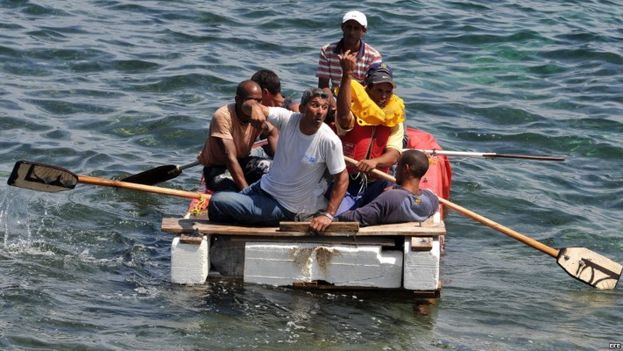
![]() 14ymedio, Havana, 13 January 2017 — Matilde sold her home just two weeks ago to pay for the immigration route to the United States. Thursday, the hope of achieving her dreams burst when president Barack Obama put an end to the wet foot/dry foot policy that granted legal residency to Cubans who reached the United States.
14ymedio, Havana, 13 January 2017 — Matilde sold her home just two weeks ago to pay for the immigration route to the United States. Thursday, the hope of achieving her dreams burst when president Barack Obama put an end to the wet foot/dry foot policy that granted legal residency to Cubans who reached the United States.
The news dropped like a bombshell on the island. “My family is desperate, having put all their hopes in this journey,” the retired woman told 14ymedio. With a son living in New Jersey, the woman planned to travel at the end of this month to Mexico and cross the border “to the land of freedom.”
Since the death of former president Fidel Castro, no other event has so shaken the Cuban reality. The announcement this Thursday affected many who normally live their lives outside politics and official issues. “I feel as if someone had snatched away my lifejacket in the middle of the sea,” said Matilde. continue reading
Attorney Wilfredo Vallín, of the Cuban Legal Association, believes that the decision is “something that belongs to the sovereignty of a State.” In 1995, during the Bill Clinton administration, the policy was approved that today “is considered opportune to change,” but “the repercussions of that in other countries is a problem of other governments.”
“It has been said that these facilities provided by the US Government encouraged emigration and now a part of the argument is over”
The attorney maintains that what happened transcends the issue of migration and touches the pillars of the ideological propaganda of the Plaza of the Revolution. “It has been said that these facilities provided by the US government encouraged emigration and now that part of the argument is over.” For Vallín the decision could “increase discontent among citizens.”
The end of this immigration policy comes at a bad time for the government of Raúl Castro. Last year closed with a stagnant economy that experienced a fall of 0.9% in the Gross Domestic Product (GDP). For those most affected by hardship and the high cost of living, the possibility of emigration to the United States was a source of permanent illusion.
However, the ruling party has welcomed a new era. Josefina Vidal, the director general for the United States in Cuba’s Ministry of Foreign Affairs, told the national media that with this suspension, “the migration crisis between Cuba and the United States is eliminated.” The end of the wet foot/dry foot policy has been a old demand of the government of the island, which has also pressed to end the Parole program for Cuban health professionals, a measure that was also suspended this Thursday.
“With these measures, Cubans who believed they could find prosperity and wellbeing in the United States will have to find another solution,” reflects opposition leader José Daniel Ferrer, leader of the Cuban Patriotic Union (Unpacu).
In a telephone conversation with this newspaper from eastern Cuba, Ferrer says now begins a stage of “thinking more about how to obtain freedom, prosperity, opportunities and rights here in our own land.” The scenario that opens “will make us much more responsible and aware that we must take the reins of our destiny as a people and as a nation here within.”
In front of the University of Havana, Ramon, 48, reflects on the possible repercussions of what happened. “Every time the popular disagreement reached a high point, the government managed to calm it by opening up emigration,” he says. “Now we are all unable to get out of this pressure cooker that is always getting hotter.”
“Political refugee status is too serious, too honorable for it to continue to function as it has until now”
Activist Eliécer Ávila, leader of the Somos+ (We Are More) movement, considers it an “excellent” decision. “The refugee status for political reasons is something too serious, too honorable for it to continue to function as it has so far,” he reflects. “Any measure that makes Cubans take more responsibility for their nation instead of fleeing it is something that should be supported.”
For opposition member Manuel Cuesta, a member of the Democratic Action Roundtable (MUAD), the elimination of this policy “should have been taken long ago to avoid the type of risky emigration that has resulted in the loss of the lives of young people, children and whole families.”
He acknowledges, however, that the decision is “controversial because those who were preparing their raft to leave early this morning have just been dissuaded in a way that cannot be appealed.” It is likely that “Trump is applauding the measure,” he said.
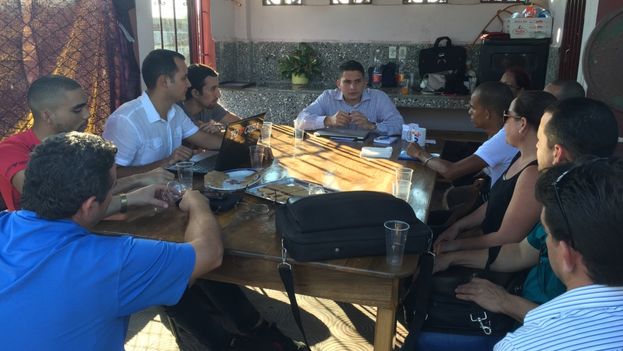
14ymedio, Havana, 12 January 2017 — Police maintained a strong operation Thursday around the headquarters of the 1010 Academy in the neighborhood of Cerro, in Havana. Activists Joanna Columbié and Georlis Olazabal were arrested while trying to access the site to participate in a conference on constitutional law, said Eliécer Ávila, president of the independent Somos+ (We Are More) movement.
“Since early this morning they have the block surrounded and do not let anyone in or out of the house,” said Avila. “We had organized a talk with the attorney Wilfredo Vallin of the Cuban Law Associatio, but the police did not allow him to leave his home,” in La Vibora, he told 14ymedio .
Meanwhile, scientist Oscar Casanella denounced the arrest of the artist Tania Bruguera “on leaving Havana” when they were traveling in a vehicle with “two mattresses and rice” for the victims of Hurricane Matthew in the eastern part of the country.
In a telephone call, Casanella said the artist had been taken to the Cotorro police station in Havana. However, the officer of the guard there denied that Bruguera was there. “We do not have any Tanya here, the one we have is a Nancy,” the police officer said through the phone line.
This second consecutive day of arrests against activists takes place a few hours after the replacement of the recently deceased Interior Minister, Carlos Fernández Gondín, by Vice Admiral Julio César Gandarilla.
For the whole of 2016, the Cuban Commission for Human Rights and National Reconciliation (CCDHRN) documented a total of 9,940 arbitrary arrests. A figure that “puts the Government of Cuba in first place in all of Latin America,” said the report of the independent organization.
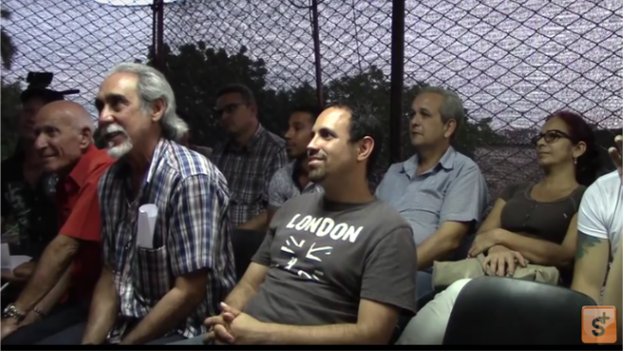
![]() 14ymedio, 23 November 2016 — Academy 1010, an initiative of the Somos+ (We Are More) Movement, experienced a second day of police harassment with a strong State Security operation around the homes of several activists, including arrests and deportations to home provinces. Today, no participants were able to reach the Havana site where courses on civil society, technology and human rights were to be held, according to information from the president of this opposition organization, Eliecer Avila, speaking to 14ymedio.
14ymedio, 23 November 2016 — Academy 1010, an initiative of the Somos+ (We Are More) Movement, experienced a second day of police harassment with a strong State Security operation around the homes of several activists, including arrests and deportations to home provinces. Today, no participants were able to reach the Havana site where courses on civil society, technology and human rights were to be held, according to information from the president of this opposition organization, Eliecer Avila, speaking to 14ymedio.
Joanna Columbié, director of the Academy initiative, said that since Monday “a cordon of patrol cars” has surrounded Avila’s home, the intended site of the conferences and classes.
“I am surprised and indignant because we never imagined that an eminently academic activity would bring a wave of arrests and arbitrary acts as if we were doing something terrible, against the law,” said Avila. continue reading
During the first day of activities, five students who managed to get close to the site were arrested, while others have been unable to leave their home provinces, said Columbié. On the opening day only “seven students were able to come” and “they received their classes normally,” she added.
Those arrested so far are Yoan Valdivieso, Pedro Acosta, Georlis Olazabal, Norberto Leyva and Alexei Gamez. From the latter the police confiscated the laptop he travels with, and threatened to prosecute him under the crime of “receiving stolen goods.”
From their home provinces, the political police will not allow Agny Almanza, Javier Rojas and Pedro Escalona to travel to the capital. Georlis Olazabal is being deported right now to the province of Camagüey.
Starting Sunday, Columbié and Avila were warned by State Security agents that they would prevent participants from getting to the conference and accused them of trying to “subvert the political order of the country.”
Through Academy 1010, Somos+ is proposing to provide “the necessary knowledge to empower hundreds of young Cubans to serve as political candidates.”
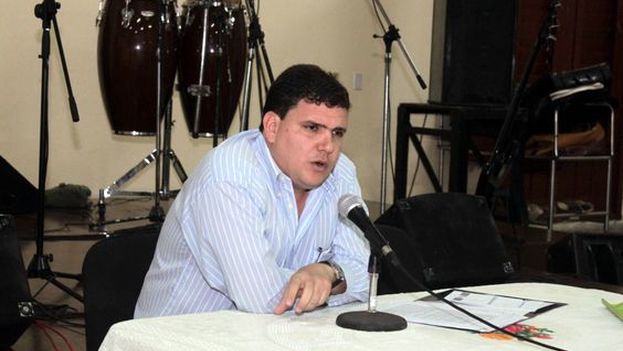
![]() 14ymedio, Eliecer Avila, 4 November 2016 — How many times have we heard the phrase “I do not want to put on a media show,” especially from people who have been victims of institutional abuse in Cuba? It would seem that there is a generalized notion that publicizing a problem hinders its solution. Is this really true? Not in my experience.
14ymedio, Eliecer Avila, 4 November 2016 — How many times have we heard the phrase “I do not want to put on a media show,” especially from people who have been victims of institutional abuse in Cuba? It would seem that there is a generalized notion that publicizing a problem hinders its solution. Is this really true? Not in my experience.
It is true that the mere fact of sharing with public opinion in a determined situation is not an act of magic that exonerates us from any frustration or suffering, but also it is a myth to believe that everything will go better if “nothing comes out on the internet” or in “the press of over there.” continue reading
I have known cases where unscrupulous leaders have trampled the dignity of workers in the most diverse areas without feeling the minimum weight of the law and much less the moral judgment of public opinion, because when abuses are committed under the shelter of silence, the victims suffer double and the victimizers remain unscathed to continue committing their crimes.
As I’m not given to relying on stories that are two old or too distant, I will mention some recent events that reaffirm this false perception. Just a few months ago Omar Everleny Perez was fired from the World Economy Studies Center, at the University of Havana. Aside from information from third parties and some timid comments from the professor himself, the reality is that nothing formal was published about it. Nor was the decision overturned.
Then there was the firing of the Radio Holguin journalist, Jose Ramon Ramirez Pantoja, for publishing the remarks of the deputy director of the Granma newspaper. In this case, also, the journalist himself approached it very timidly and in his close circle, when it came time to call things by their name, although more comments circulated on Facebook than in the previous case. Nor was there any reversal of course, with the final result of the process far worse than one might think.
Last week, this newspaper published an interview with Professor Juan Antonio Fernandez, expelled from the University of Havana, in which he also mentioned this phrase: “I don’t want to make a media show of this.” It’s curious how we have embedded in our hypothalamus that sharing our problems is an act of “ideological weakness,” a “concession to the enemy” or, even worse, a betrayal of who knows who.
But apparently it’s very different when the problem happens to a “comrade” with another country. The exaggerated media coverage by Telesur and other national media in the case of Victor Hugo Morales comes to mind, when his contract was cancelled with an Argentinian television network after it stopped receiving the Kirchnerista check (bribe) after the election of Mauricio Macri as Argentina’s new president.
The headlines in the official press denounced the “abominable censorship” which the militant was supposedly a victim of, who certainly, thanks to this whole campaign, didn’t delay in finding another foxhole. Indeed, that’s one of the good things that happens in more than a few cases: when you have closed one door and others, who share your vision, can cooperate in opening another one even wider.
The phobia that exists among Cubans about telling the media what has happened to them has two key components. One, the fear of reprisals that might be even worse by a system that doesn’t tolerate being accused of anything, and that has control of all the strings to weave the most sophisticated traps. Two, the lack of confidence in national public opinion that has no real weight, nor is it accustomed to pressuring any institution, and much less the government, so that the limited repercussion that a specific case will have overseas and this can come via the antenna, distorted or manipulated.
In any case, I believe there is a legitimate right to make public knowledge what we consider exceeds our limited personal capabilities of self-defense. But this confidence that any of us can have in what exists and what could determine the solidarity of our people, should be cultivated with the rightful exercise of citizen opinion, the responsibility and seriousness of the media and, especially, the strong and effective articulation a broad civil society that covers every corner of the country.
National public opinion should become the protective shell of each fair person and the worst nightmare of those who violate their rights. This public opinion is not an abstract or distant entity: it is you, it is me, it is all of us.
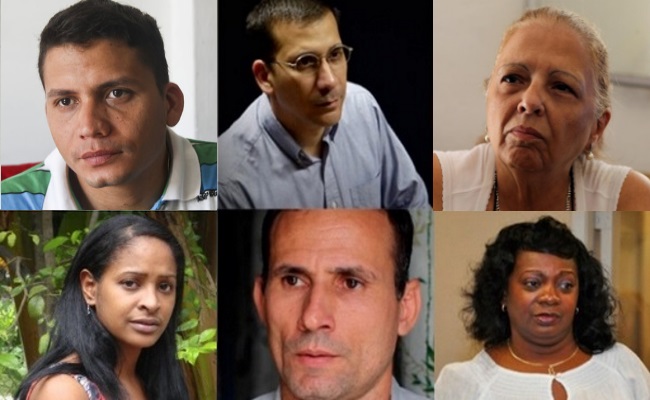
 Cubanet, Ernesto Perez Chang, Havana, 9 November 2016 – The elections in the United States, with the victory of the Republican Donald Trump and the defeat of the Democrat Hillary Clinton, contrary to the predictions of most polls, has captured the attention of the world’s public opinion in recent hours due to the decisive nature of United States policy in the international arena.
Cubanet, Ernesto Perez Chang, Havana, 9 November 2016 – The elections in the United States, with the victory of the Republican Donald Trump and the defeat of the Democrat Hillary Clinton, contrary to the predictions of most polls, has captured the attention of the world’s public opinion in recent hours due to the decisive nature of United States policy in the international arena.
The normalization of relations between the governments of Cuba and the United States and the diverse opinions generated by the lengthy diplomatic process and packages of measures aimed at easing the embargo, implemented by current US president Barack Obama, have given rise to a broad spectrum of opinions within Cuban civil society, such that some of the main opposition leaders on the island have expressed their views to CubaNet to the election results announced at dawn on Wednesday.
Antonio Rodiles, coordinator of Estado de Sats (State of Sats) and organizer of the We All March campaign, says: “We expect consistency of those who, within Cuba, maintained a policy against Trump and were confident in Hillary’s victory. (…) Maybe difficult times will come for the process of normalization of relations with Cuba and the continuity of Obama’s program. We expect another direction in the dialogue and a president who places the issue of respect for human rights and freedom of expression as a priority, a determinant, at any negotiating table.” continue reading
Jose Daniel Ferrer, a member of the Patriotic Union of Cuba, UNPACU, argues that the electoral decision does not mean negative effects on the relations between the two countries: “I do not think the difference is notable. The American people have chosen. The new president will do what suits the citizens of the United States and, as he should, prioritize the interests of his nation (…). The candidate the people believed to be better has won (…). (Regarding Cuba) common sense in the process of normalization of relations will prevail and we expect a strong hand with the dictatorship because (Cuba) is a regime contrary to the interests US, it is a regime that no American candidate would never agree to in the style of Venezuela or China. (…) We expect better relations with the new government.”
The regime opponent Martha Beatriz Roque said: “It seems that the American people have passed the bill to the Democratic Party. Many people are concerned about the ways in which Trump has expressed himself during his campaign, but I think that concern should be minimized because surely the Republican Party will take control of the situation. (…) With regards to his impact on the Cuba issue I think there are measures taken by Obama that are irreversible. Especially because America is a democracy, not like Cuba, which is governed by a totalitarian. It will not be easy to give a twist to relations with the island. However, I think this gentleman will be educated by his advisers enough to not make the mistakes of the previous president.”
Eliecer Avila, activist with the movement Somos+ (We Are More), confessed to not having had a previous position in favor or against any candidate, although he said about his expectations: “I didn’t support either of them one hundred percent. In Hillary Clinton I saw very positive support for Obama’s policy (toward Cuba). (…) Donald Trump has shown some strong positions but I do not think that will change the policy of his predecessor but, apparently, will negotiate from other positions.”
The lawyer Laritza Diversent , founder of Cubalex, believes that the elections were a reflection of the opinion of the American people and believes that Cuba will occupy an important place in the policy of President-elect: “The process of normalization of relations between the United States and Cuba is irreversible. (…) There is a responsibility to the legacy of Obama. The United States, with its current policy, is leading positive changes. Many challenges are imposed on the new president. We should also consider the views of the US Congress and other powers in that nation.”
Berta Soler, leader of the Ladies in White, believes it is too early to make predictions about the directions Trump will take regarding policies on Cuba: “We have to wait. I have never preferred one or the other because there is a reality: it is not about the Cuban President but about the President of the United States. Someday I want Cuba to be able to elect a president in a way similar way to that in the United States. (…) We don’t know about Trump, we have to wait. There may be changes but I do not know, I’d rather wait. ”
The election of the 45th President of the United States has not only launched numerous questions in the world’s most important economic sectors. For Cuba, undergoing a process of rapprochement with the United States that could help find a solution to economic stagnation, for the government, or a way for democratization, for civil society, the policies toward the island that will be decisive in the immediate future will be designed by Trump.